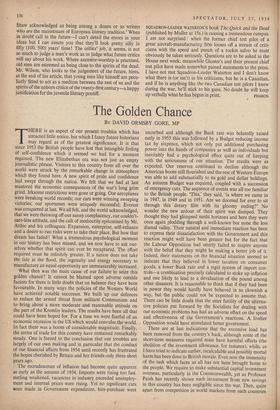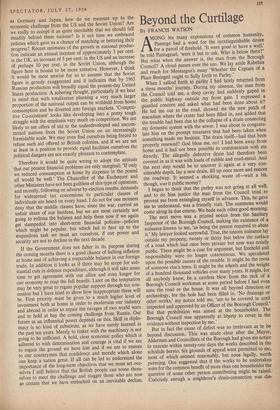The Golden Chance
BY DAVID ORMSBY GORE, MP THERE is an aspect of our present. troubles which has attracted little notice, but which I fancy future historians may regard as of the greatest significance. It is that since 1953 the British people have lost that intangible feeling of self-confidence which it seemed we had for a moment regained. The new Elizabethan era was not just an empty journalistic phrase. Visitors to this country from all over the world were struck by the remarkable change in atmosphere 'which they found here. A new spirit of pride and confidence had swept through the nation. We felt that we had at last mastered the economic consequences of the war's long grim grind. Irksome restrictions were gone or going. Our aeroplanes were breaking world records; our cars were winning sweeping victories; our sportsmen were uniquely successful; Everest was conquered at last. We all felt, and the world acknowledged, that we were throwing off our sunny complacency, our couldn't- care-less attitude, and the cult of mediocrity epitomised by Mr. Attlee and his colleagues. Expansion, enterprise, self-reliance and a desire to run risks were to take their place. But how that dream has faded! What a tremendous psychological moment in our history has been missed, and we now have to ask our- selves whether that spirit can ever be recaptured. The effort required must be infinitely greater. If a nation does not take the tide at the flood, the ingenuity and energy necessary to manufacture an equal opportunity are immeasurably increased.
What then was the main cause of our failure to seize this golden chance? It cannot be blamed upon adverse outside factors for there is little doubt that on balance they have been favourable. In many ways the policies of the Western World have achieved notable successes. We built up our defences to reduce the armed threat from militant Communism and to bring about a more moderate and reasonable attitude on the part of the Kremlin leaders. The results have been all that could have been hoped for. For a time we were fearful of an economic recession in the US which would convulse .the world. In fact there was a boom of considerable magnitude. Finally, the terms of trade for this country have remained remarkably steady. One is forced to the conclusion that our troubles are largely of our own making and in particular that the conduct of our financial affairs from 1954 until recently has frustrated the hopes cherished by Britain and her friends only three short years ago.
The recrudescence of inflation had become quite apparent as early as the autumn of 1954. Imports were rising too fast, sterling weakened, vacancies in industry exceeded unemploy- ment and internal prices were rising. Yet no significant cuts were made in Government expenditure, hire-purchase went uncurbed and although the Bank rate was belatedly raised. early in 1955 this was followed by a Budget reducing income tax by sixpence, which not only put additional purchasing power into the hands of companies as well as individuals but inevitably had a psychological effect quite out of keeping with the seriousness of our situation. The results were as expected. Our reserves continued to decline although the American boom still flourished and the rest of Western Europe was able to add substantially to its gold and dollar holdings. An autumn Budget was required, coupled with a succession of emergency cuts. The sequence of events was all too familiar to the British people. 'This,' they said, 'is where we came in in 1947, in 1949 and in 1951. Are we doomed for ever to sit through this dreary film with its gloomy ending?' No wonder the new ardour of their spirit was damped. They thought they had glimpsed sunlit horizons and here they were once again plodding through a well-known but none the less dismal valley. Their natural and immediate reaction has been to express their dissatisfaction with the Government and this reaction might well have been greater but for the fact that the Labour Opposition had utterly failed to inspire anyone with the belief that they might be making a better job of it. Indeed, their statements on the financial situation seemed to indicate that they believed in lower taxation on consumer goods, a lower Bank rate and a rigid system of import con- trols—a combination precisely calculated to stoke up inflation and one likely to lead to a devaluation of the pound among other disasters. It is reasonable to think that if they had been in power they would hardly have behaved in so clownish a way, but the public could not be expected to assume that. There can be little doubt that the utter futility of the alterna- tive policies put forward by the Socialists for dealing with our economic problems has had an adverse effect on the speed and effectiveness of the Government's reactions. A livelier Opposition would have stimulated better government.
There are at last indications that the excessive load has been removed from the country's back, although some of the short-term measures required must have harmful effects (the abolition of the investment allowance, for instance), while, as 1.have tried to indicate earlier, incalculable and possibly mortal harm has been done to British morale. Even now the immensity of the task which faces us all has not been brought home to the people. We require to make substantial capital investment overseas, particularly in the Commonwealth, yet as Professor Paish has recently shown such investment from new savings in this country has been negligible since the war. Then, quite apart from competition in world markets from such countries as Germany and Japan, how do we measure up to the economic challenge from the US and the Soviet Union? Are we really to accept it as quite inevitable that we should fall steadily behind these nations? Is it not time we embraced policies which gave us a chance of matching or bettering their progress? Recent estimates of the growth in national produc- tion indicate an annual increase of approximately 3 per cent. in the UK. an increase of 5 per cent. in the US and an increase of perhaps 10 per cent. in the Soviet Union, although the figure here is bound to be more tentative. However, I think it would be most unwise for us to assume that the Soviet figure is grossly exaggerated and it indicates that by 1963 Russian production will broadly equal the present-day United States production. A sobering thought, particularly if we bear in mind that with totalitarian planning a very much larger proportion of the national output can be withheld from home consumption and be diverted into foreign markets. 'Competi- tive Co-existence' looks like developing into a pretty tough struggle with the emphasis very much on competition. We are likely to see offers of aid to the underdeveloped and uncom- mitted nations from the Soviet Union on an increasingly formidable scale. We may even find ourselves being forced to refuse such aid offered to British colonies, and if we are not at least in a position to provide equal facilities ourselves the political dangers are not exactly pleasant to contemplate.
Therefore it would be quite wrong to adopt the attitude that our present financial problems are only marginal; 'If only we reduced consumption at home by sixpence in the pound all would be well.' The Chancellor of the Exchequer and other Ministers have not been guiltless of this type of optimism, and recently, following on adverse by-election results, demands for widespread tax concessions to particular classes of individuals are heard on every hand. I do not for one moment deny that the middle classes have, since the war, carried an unfair share of our burdens, but we are most certainly not going to redress the balance and help them now if we again get stampeded into short-term financial policies—policies which might be popular, but which fail to face up to the stupendous task we must set ourselves, if our power and security are not to decline in the next decade.
If the Government does not falter in its purpose during the coming months there is a good chance of halting inflation at home and of achieving a respectable balance in our foreign trade. In addition it looks as if there may be scope for sub- stantial cuts in defence expenditure, although it will take some time to get agreement with our allies and even longer for our economy to reap the full benefit. Later on the temptation may be very great to regain popular support through tax con- cession but I have tried to show how inappropriate these will be. First priority must be given to a much higher level of investment both at home in order to modernise our industry and abroad in order to repair the ravages of two world wars and to hold at bay the coming challenge from Russia. Our future as an influential power depends on this. Skill in diplo- macy is no kind of substitute, as we have surely learned in the past ten years. Merely to tinker with the machinery is not going to be sufficient. A bold, clear economic policy which is adhered to with determination and courage is vital if we are to regain the ground we have lost and if we are to restore to our countrymen that confidence and morale which alone can keep a nation great. If all can be led to understand the importance of the long-term objectives that we must set our- selves I still believe that the British people can rouse them- selves to meet the challenge and stagger those who are now so certain that we have embarked on an inevitable decline.



































 Previous page
Previous page